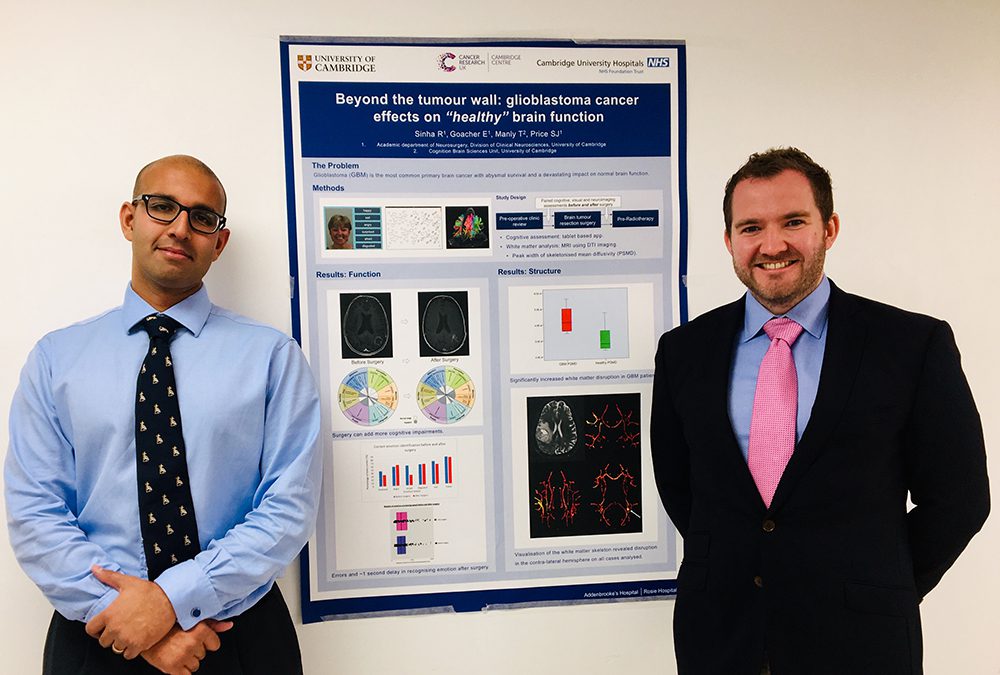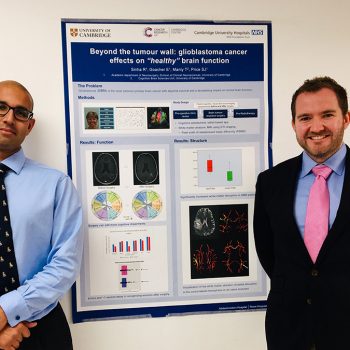Brain tumour poster voted the public’s favourite
A poster highlighting research into how patients think both before and after surgical treatment for the most common type of brain tumour has won a competition run by NIHR Cambridge BRC.
Dr Rohit Sinha and Dr Ed Goacher’s poster was one of 17 research posters on display at the popular ‘Brainworks’ Open Evening, showcasing the latest local research in dementia, mental health and neuroscience, that took place in November.
Dr Sinha, based in the Department of Neurosurgery at the University of Cambridge, said: “Our research is about understanding how glioblastoma (GBM) and its treatments can affect the way patients think, and we wanted the poster to convey this.
“GBM is a rare but eventually fatal cancer that can have a devastating impact on normal brain function. In fact patients often first notice problems with their thinking – including memory, decision-making and language – before they are diagnosed with a brain scan.
“Surgical treatment and radiotherapy can make these problems worse, and our research explored such effects on patients’ brain functions, which are so important to overall quality of life.”
Patient involvement
Dr Sinha and his team involved patients from the very start of their research planning. This helped to secure the required funding and led to changes in the study protocol to make assessment-test visits less stressful for patients.
As a result, the study has a very high recruitment rate, with patients continuing to take part in the cognitive tests as they undergo surgery and radiotherapy.
Benefit for patients
The GBM research carried out by Dr Sinha and his team means that clinicians can better predict which patients are most likely to face problems in their day-to-day functioning, and try to provide rehabilitation to protect these vital functions.
The team, led by Principal Investigator and Academic Consultant Neurosurgeon Mr Stephen Price, has applied for an NIHR Research for Patient Benefit Award to build on this work by trialling a rehabilitation tool to help patients with GBM with social and emotion related decision-making, an area highlighted in the data collected by Dr Sinha.

Dr Sinha (left) and Dr Goacher before their winning poster “Beyond the tumour wall: glioblastoma cancer effects on “healthy” brain function”
Dr Sinha said: “We are now looking to adjust our treatments to minimise further problems in brain function.”
Dr Amanda Stranks, Patient and Public Involvement in Research Lead at Cambridge BRC, said: “We were overwhelmed with the positive response shown to the poster competition by researchers. This poster was a worthy winner, clearly outlining their research and the benefit it has for patients in a publicly accessible way.
“It’s definitely a conversation starter – I wanted to find out more about this research and what will happen next – which is the sign of a great poster.”
Dr Sinha’s advice on involving patients for other researchers? “Just do it! And as early as possible. There are lots of excellent organisations who can help, including the NIHR Research Design Service and the PPI team at Cambridge BRC, who can put you in touch with patient panels and focus groups.
“It’s important to remember that the patient is the expert in their own condition – and if they’re not involved in planning research, you risk overlooking vital perspectives and insights that would help strengthen study design.”
- Find out more about the research carried out at the Cambridge Brain Tumour Imaging Laboratory
- Get in touch with the PPI team at Cambridge BRC



